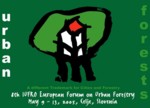 09/05/05 - 13/05/05 Celje & Ljubljana, Slovenia
09/05/05 - 13/05/05 Celje & Ljubljana, SloveniaThe forest and the city are two extremes: the forest on one side as highly developed natural ecosystem, and the city on the other as the most perfect man made (eco)system. They are both integrated in an urban forest.
Modern man is rediscovering the value of physical, emotional and mental well-being. Forests, as the most preserved natural land ecosystems are an ideal environment for a human being to practice »re-creation«.
Although it perfectly fits to the prevailing economic standards of society (low cost & cost effective), the social values of forests still seem to be underdeveloped and inadequately utilised. It is definitely a challenge and an opportunity for for forestry and related professions.
The European Forum on Urban Forestry (EFUF) is an initiative of the International Union of Forest Research Organisations (IUFRO), Workgroup 6.14.00 (Urban Forestry) and the European Urban Forestry Research & Information Centre (EUFORIC). It is an unique venue where urban forestry professionals meet scientists and policy-makers within the field. The forum meets yearly, hosted by one of the members. The previous forum was held in Stockholm, Sweden.
The 8th European Forum on Urban Forestry will take place in Slovenia, a country with almost 60% forest cover. Forests, most of them are privately owned, are a constituent and vital part of the Slovenian landscape. More than a half of the Slovenian population lives in urban areas where forest cover is significantly lower (about 25%).
Relatively natural and well preserved forests with diverse natural structure may be attributed to the careful management in the past. The concept of close-to-nature forest management, based on natural regeneration and moderate small-scale intervention has been developed and practiced in the majority of the Slovenian forests for the last 40 years.
While the present forest management may adequately link economic interests and environmental functions, the growing importance of social forest values demands new knowledge and practice, where urban forests are playing an increasingly important role.



